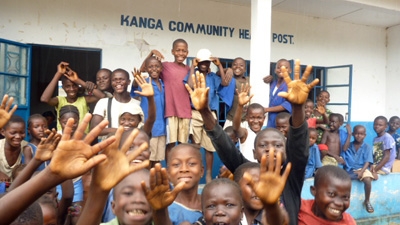PORT LOKO, March 14, 2012 -- In a clinic in Moyamba district in southern Sierra Leone, mothers stand in line with their infants to receive immunizations that the government now provides free of charge. It is a hopeful picture for a country that emerged from a brutal civil war just ten years ago. Yet, a closer look reveals that as each mother reaches the front of the line, the nurse is demanding six cups of rice before she will provide the immunization. Feeling powerless, the mothers comply.
Elizabeth Massalay, a community paralegal, shared this story during a recent paralegal training in Makeni, Sierra Leone. During an intensive three-day training session, Namati, a new international organization dedicated to legal empowerment, prepared community paralegals from five organizations to tackle challenges in the delivery of health services. The World Bank’s Justice for the Poor program is working with Namati to track the paralegals’ work and assess the results.
Sierra Leone’s health statistics are sobering – the country ranks 180 out of 187 in the 2011 Human Development Index and is one of the most dangerous places in the world for a woman to give birth, with one out of every seven women dying during pregnancy or childbirth. Why turn to the law to respond to such tremendous health care needs? How can paralegals contribute to improving health service delivery in a manner that doctors, nurses, health administrators, and health goods cannot?
As Sonkita Conteh, a Sierra Leonean lawyer who leads Namati’s legal empowerment work in Sierra Leone, explains, effective health care delivery requires not only adequate staff and health inputs; it also requires accountability. Sierra Leone’s health statistics reflect breakdowns within state institutions that lead to absent nurses, improper use fees (despite the government’s bold Free Health Care Initiative (FHCI) that guarantees free health care services to pregnant and breastfeeding women and children under five), and “leakage” of up to 30 percent of FHCI drugs before they reach clinics according to government of Sierra Leone and UNICEF statistics.
For Namati and its partner paralegal organizations in Sierra Leone, responding to such breakdowns requires an understanding of health policy and regulations - what the state must provide and to whom - and knowing where and how to apply pressure when the state and its agents fail to do so.
In Sierra Leone, community paralegals (lay persons trained in the law and the workings of government) are at the front-line of navigating administrative accountability channels. Although there are only about 200 practicing lawyers in Sierra Leone, paralegals currently provide basic justice services in approximately 36 percent of Sierra Leone’s 149 chiefdoms. Yet to date, paralegals’ role in promoting health care delivery has been underexplored.
The next chapter of Massalay’s story provides an example of how a community paralegal might contribute to improving health care delivery. Massalay, who works as a paralegal in the Western area, happened to be visiting her sister in Moyamba district and was standing at the back of the immunization line with her niece. She observed the nurse asking for rice and intervened, telling the nurse that any such charge was improper under the government’s FHCI, and she remained at the clinic the rest of the day to monitor the nurse.
As Namati program officer Daniel Sesay explained, trained paralegals such as Massalay might make regular, unannounced visits to the health clinic to help ensure maternal and child health services are truly provided free of charge. Paralegals might also engage the village health committee, a local structure tasked with ensuring effective clinic operations, to monitor the nurse’s behavior.
Yet this story also illuminates the challenges that legal empowerment advocates such as Sesay expect as they work in the service delivery context. To have impact on services at scale, community paralegals will need to tackle injustices with origins far more complex than the actions of an individual nurse. What if the nurse has inadequate training? What if, despite the FHCI’s promises, the nurse lacks drugs to supply to patients?
In Sesay’s eight years of experience, he has found that such community-level problems are challenging to diagnose, monitor, and solve, and they often pit paralegals against powerful interests in the community and beyond. One way a paralegal might address the problem of insufficient drugs at a clinic, for example, would be to work with concerned service users to engage the village health committee or the District Health Management Team. However, if drugs are “disappearing” district-wide, a paralegal may need to turn to the police or even the Anti-Corruption Commission. In pursuing a remedy, the paralegal may come head-to-head with prominent and powerful adversaries with a vested stake in maintaining the status quo.
Additionally, the paralegal trainers in Makeni emphasized that paralegals must remain aware of the importance of empowerment in legal empowerment work – they should aspire to become less essential in the long run by engaging citizens in the potential avenues for redress and ultimately emboldening citizens to engage institutions themselves through structures like village health committees. This “social accountability” approach is one that certain government officials in Sierra Leone have embraced as well. Dr. Francis Smart, district medical officer for Bonthe district, explained that community members are often best equipped to patrol harmful practices in the health sector such as the theft of drugs. Smart sees community members and their local accountability structures as critical contributors in completing the broader and exigent mission of ensuring quality, sustainable, and accountable health care delivery under the FHCI.
The Justice for the Poor program will assess whether paralegals help improve service outcomes and whether they offer a useful complement to more traditional accountability tools such as score cards, community compacts, and non-financial awards that the government of Sierra Leone is also currently evaluating with the World Bank’s support.

